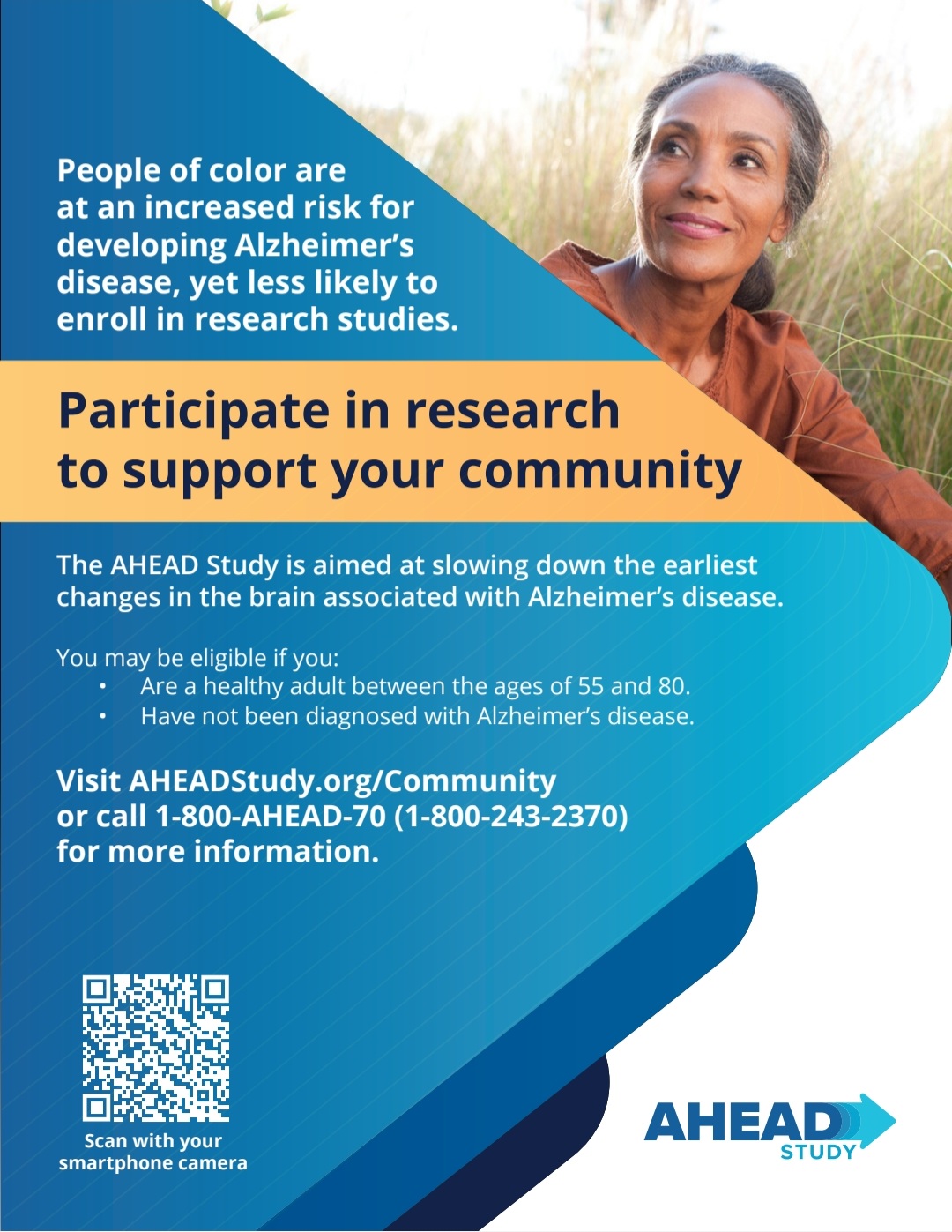Study Participants Needed During Alzheimer’s Disease Awareness Month
Researchers in Nashville need volunteers for the NIH-funded AHEAD Study this winter and beyond. November is Alzheimer’s Disease Awareness Month and researchers at Vanderbilt University Medical Center are looking for volunteers to join the AHEAD Study which tests whether intervening ahead of Alzheimer’s symptoms can prevent future memory loss and dementia. Most people have been […] The post Study Participants Needed During Alzheimer’s Disease Awareness Month appeared first on The Tennessee Tribune.


Researchers in Nashville need volunteers for the NIH-funded AHEAD Study this winter and beyond.
November is Alzheimer’s Disease Awareness Month and researchers at Vanderbilt University Medical Center are looking for volunteers to join the AHEAD Study which tests whether intervening ahead of Alzheimer’s symptoms can prevent future memory loss and dementia.
Most people have been or will be touched by Alzheimer’s disease—whether it’s family members, friends, neighbors or colleagues. African Americans are twice as likely as non-Hispanic white Americans to have Alzheimer’s disease or a related dementia. In fact, African Americans have higher risk of dementia than any other US ethnic racial group. The AHEAD Study presents a tremendous opportunity to possibly get AHEAD of the disease before it starts.
The AHEAD Study consists of two different clinical trials testing the same investigational treatment known as BAN2401 (Lecanemab). Participants are enrolled in one of the two trials based on the level of amyloid, a protein that builds up in people who can go on to have memory problems and develop Alzheimer’s disease. Discovering a treatment that targets brain changes early means doctors may be able to one day prevent memory loss.
In addition to being Alzheimer’s Disease Awareness Month, November is also National Family Caregivers Month. Vanderbilt researchers encourage people with a family history of Alzheimer’s to learn more about the AHEAD Study and see if they are eligible to participate. According to the National Alliance for Caregiving, there are 53 million family caregivers in the United States, of which 15.7 million (26%) are caring for someone with Alzheimer’s disease or dementia. The study has a priority to enroll people who reflect the diversity of the United States and people at the greatest risk for developing Alzheimer’s disease.
The AHEAD Study seeks 1,165 participants from North America. There are more than 100 study locations worldwide, including in North America, Japan, Singapore, Australia, and Europe.
For more information or to see if you or a family member may be eligible, call Blake Wilson, 615-936-4997 or blake.wilson@vumc.org
About AHEAD / BAN2401 (lecanemab)
The AHEAD Study is made up of two different clinical trials testing the same investigational treatment (known as BAN2401, lecanemab) at different doses. During the study, participants will receive intravenous (IV) infusions of BAN2401 (lecanemab) tailored to their risk of developing memory loss, or a placebo, an inactive substance designed to mimic the appearance of the drug.
At different points in the study, participants have a PET scan (or Positron Emission Tomography brain scan) to look at amyloid and tau (another protein) in the brain. The PET scan takes pictures of participants’ brains, allowing researchers to see and track changes in amyloid and tau levels.
About BAN2401 (lecanemab)
BAN2401 (lecanemab) is a humanized monoclonal antibody for Alzheimer’s disease (AD) that is the result of a strategic research alliance between Eisai and BioArctic AB (Headquarters: Sweden). BAN2401 (lecanemab) selectively binds to neutralize and eliminate soluble, toxic Aβ aggregates (protofibril) that are thought to contribute to the neurodegenerative process in AD. As such, BAN2401 (lecanemab) may have the potential to have an effect on disease pathology and to slow down the progression of the disease. Eisai obtained the global rights to study, develop, manufacture and market BAN2401 (lecanemab) for the treatment of AD pursuant to an agreement concluded with BioArctic in December 2007. Currently, a global clinical Phase III study (Clarity AD) of BAN2401 (lecanemab) in early AD is underway. Now also in a Phase III trial (AHEAD 3-45) for preclinical AD, BAN2401 (lecanemab) is being jointly developed by Eisai and Biogen Inc. (Headquarters: Cambridge, M.A.).
About the Alzheimer’s Clinical Trials Consortium
The Alzheimer’s Clinical Trial Consortium (ACTC) is a state-of-the-art infrastructure network established with funding by the NIA to support the conduct of clinical trials across the continuum of Alzheimer’s Disease (AD). The ACTC leverages the depth and breadth of AD clinical research teams at USC, Harvard, and the Mayo Clinic, as well as the considerable experience of investigators at 35 expert AD trial sites to provide an optimal infrastructure, utilizing centralized resources and shared expertise, to accelerate the development of effective interventions for Alzheimer’s disease and related disorders (ADRD).
The post Study Participants Needed During Alzheimer’s Disease Awareness Month appeared first on The Tennessee Tribune.







